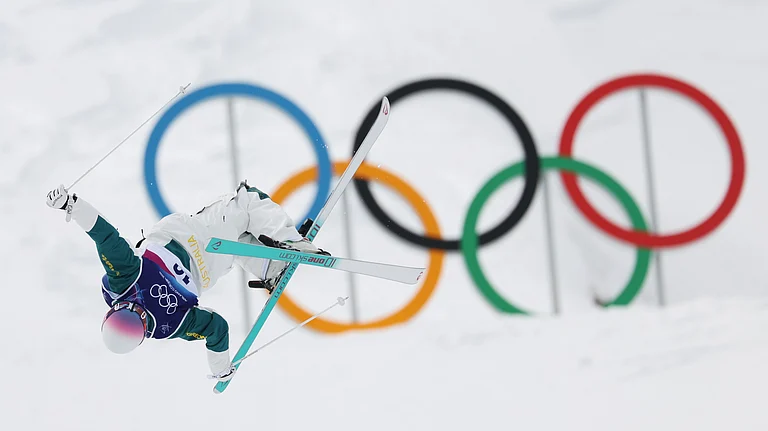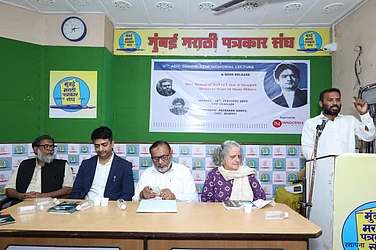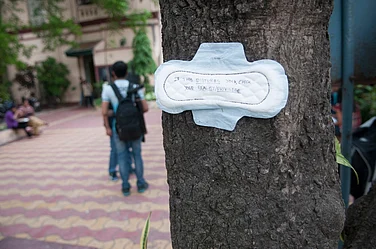The Supreme Court of India has started hearing a clutch of petitions seeking legal recognition of same-sex marriages.
While the petitioners are arguing on a number of grounds related to personal laws, the Union government is opposing the petitions. Just two days back, the Centre challenged the maintainability of the petitions.
Gender rights campaigners say that legal recognition of marriages is the next logical step after the decriminalisation of homosexuality in 2018.
Here we retrace the timeline for the recognition of same-sex marriages and explain what the petitions are arguing.
Treating gay sex as 'unnatural'
For over a century, gay sex was considered to be "unnatural" in India, as per a law made by the British rulers.
Section 377 of the Indian Penald Code (1860) addressed "unnatural acts" that included homosexual activities as well. It could be punished with up to 10 years in prison and was clubbed with other offences such as sex with animals.
"Whoever voluntarily has carnal intercourse against the order of nature with any man, woman or animal, shall be punished with 1[imprisonment for life], or
with imprisonment of either description for term which may extend to ten years, and shall also be liable to fine," said Section 377.
Notably, the law did not specify what exactly comprised "carnal intercourse against the order of nature", but it came to understood as anal or homosexual sex or any other sexual act that is not procreation. Scholars have said that Section 377 is rooted in the Christian beliefs of European colonial rulers of the time, meaning they imposed their morality on the colonised population.
Both [Section 377, 377 (A)] reflect the imposition of a particular set of morals by the majority at a particular point in history, when politics and lawmaking were dominated by Christian, pro-heterosexual Europe," notes Lynette J. Chua Kher Shing in her paper in Saying No: Sections 377 and Section 377A of the Penal Code in the Singapore Journal of Legal Studies.
Lynette J. Chua Kher Shing further writes that a whole lot categories of sexual acts were technically under the ambit of Section 377.
She writes, "What has been more problematic is oral sex, primarily, fellatio. The judicial treatment of fellatio indicates some discomfort with imposing the 'morality' of section 377 on consenting couples who do not accept or practice that morality. 'Carnal intercourse against the order of nature' —based on its staunch canonical roots— would mean any sexual intercourse that bears no possibility of conceiving human beings.Strictly speaking, this would include vaginal intercourse involving the use of contraception or during a woman's biological cycle when she cannot conceive."
Later, the marriage laws also were also such crafted that they referred to the marriage of a man and woman as per the heteronormative point of view.
Legal campaign against IPC Section 377
After over a century of Section 377 of IPC being in existene, the Naz Foundation challenged the constitutionality of the provision in the Delhi High Court.
The High Court dismissed the petition in 2004. The NGO approached the Supreme Court against the dismissal and the Apex Court ruled that the petition should be heard. Following the Apex Court's ruling, the petition was heard by the Delhi High Court.
In 2009, the Delhi High Court ruled that Section 377 was unconstitutional, thus decriminalising homosexuality.
"The Delhi High Court ruled in 2009 that Section 377 cannot be used to punish sex between two consenting adults – this violates the right to privacy and personal liberty under Article 21 of the Constitution. The Court held that classifying and targeting homosexuals violates the equal protection guarantee under Article 14 of the Constitution. Section 377 thus violated human dignity which forms the core of the Indian Constitution," notes SC Observer.
The Delhi High Court judgement was challenged in the Supreme Court and the Apex Court reversed the judgement in 2013, thus making homosexual activities criminal again.
"It also held that Section 377 criminalises certain acts and not any particular class of people. It also alluded to the minuscule number of people who were members of the LGBTI community and the fact that only a fraction amongst them had been prosecuted under Section 377," notes SC Observer.
A curative petition against the SC judgement was filed. Meanwhile, another landmark judgement concerning privacy paved the way for the filing of a separate plea seeking decriminalisation of the homosexuality.
In the Puttaswamy judgement (2017), the Supreme Court held privacy as a fundamental right that also extended to homosexual persons.
"According to the judges in this case, homosexuals need not be discriminated or harassed just for their sexual orientation. They are like us and they
equally deserve their right to privacy and state cannot discriminate on the basis of sexual orientation and criminalise the act," notes Anmol Singla in paper Homosexuality Post Puttaswamy Judgement - A Constitutional Violation of Right to Privacy?.
This paved the way for Navtej Singh Johar and others file a petition in the Supreme Court.
Decriminalisation of homosexuality
The Supreme Court decriminalised homosexuality in 2018 in the Navtej Singh Johar vs Union of India case.
"On September 6th, 2018 the five-judge Bench partially struck down Section 377 of the Indian Penal Code, decriminalising same-sex relations between consenting adults. LGBT individuals are now legally allowed to engage in consensual intercourse," notes SC Observer.
However, parts of Section 377 related to sex with animals and non-consensual sex continues to be criminalised.
The next step: Legalisation of same-sex marriages
Gender rights campaigners say that legal recognition to marriages of same-sex persons is the next logical step after the decriminalisation of homosexuality.
Petitions were filed in high courts across the country seeking such recognition under various Hindu Marriage Act (HMA), Specialm Marriage Act (SMA), etc. Since personal affairs like marriages and succession in India are governed by religion-specific laws in the absence of a uniform civil code, relief has also been sought under specific laws.
The Supreme Court has often extended constitutional provisions and laws to include certain acts under the legal ambit over the years, such as live-in relationships. Even as there exists no law addressing live-in relationships, the Judiciary has termed it legal through a series of judgements. Similarly, some petitioners seek interpretation of existing laws to seek legal recognition of same-sex marriages.
However, since marriage is the most consequential social and legal relationship, some quarters have argued that Legislature and not Judiciary should be deciding on the question of same-sex marriages.
One of the earliest petitions seeking recognition of same-sex marriages in India was filed in 2020 in the Delhi High Court by Abhijit Iyer-Mitra. He argues that the Hindu Marriage Act (HMA) does not distinguish between heterosexual and homosexual marriages in its wording. To drive this point, he argues that HMA requires "any two Hindus" for a marriage, according to a copy of the petition accessed by Outlook.
While listing the conditions for marriage, HMA’s Section 5 says, "A marriage may be solemnised between any two Hindus…."
Though the petition concerns the HMA, it also notes that Special Marriage Act (SMA) also does not prohibit same-sex marriages in its wording. It further says that the non-recognition of same-sex marriage violates the Right to Equality in Article 14 of the Constitution of India, Freedom of Religion in Article 25, and Right to Life in Article 21.


























